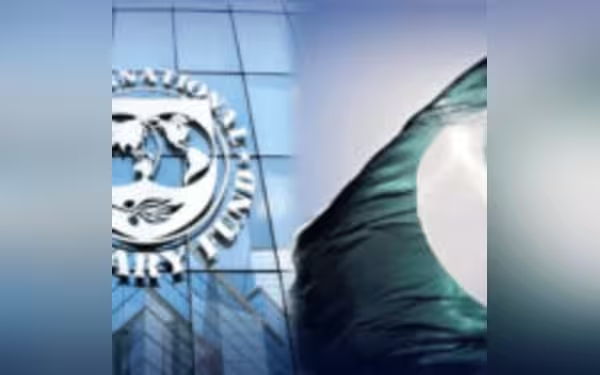Saturday, November 16, 2024 07:38 PM
Pakistan's Economic Gamble: Meeting IMF Demands for Stability
- Pakistan negotiates with IMF for economic stability.
- Prime Minister emphasizes commitment to reforms.
- IMF conditions may impact consumer prices.
 Image Credits: pakistantoday
Image Credits: pakistantodayPakistan seeks to stabilize its economy through IMF negotiations, emphasizing necessary reforms and potential long-term independence.
As Pakistan grapples with one of its most challenging economic crises, the nation finds itself once again in negotiations with the International Monetary Fund (IMF). The last agreement, a Stand-by Arrangement (SBA), was approved in July 2023, marking a pivotal moment for the country’s economic stability. The Prime Minister, Shehbaz Sharif, has openly acknowledged the immense pressure on the government to fulfill the IMF's conditions, highlighting the ongoing struggle to stabilize the economy amidst recurring financial turmoil.
The relationship between Pakistan and the IMF has been characterized by numerous financial interventions aimed at addressing the country’s economic challenges. Historically, these interventions have been crucial in restoring economic stability and instilling confidence among international investors. Each agreement comes with its own set of conditions, designed to ensure that the country implements necessary reforms to improve its fiscal discipline.
The Stand-by Arrangement (SBA) is specifically tailored for short-term financial solutions, providing assistance to countries in distress while requiring them to undertake reforms that will lead to better economic conditions. For Pakistan, this often translates into implementing structural reforms that are essential for long-term recovery. The recent approval of a $3 billion SBA by the IMF’s Executive Board on July 12, 2023, was the result of extensive negotiations, emphasizing the urgent need for Pakistan to address its economic issues.
Prime Minister Shehbaz Sharif has made it clear that the government is committed to meeting the IMF's conditions. He stated, "We hope that all conditions and requirements of the IMF will be met in time and our case will be approved by the [IMF Executive] board." This commitment is vital, as failure to implement the necessary reforms could lead to a continuous cycle of borrowing, ultimately leaving the economy in a deeper deficit.
In a hopeful tone, the Prime Minister expressed that this loan could be the last one for the decade, indicating a strategic goal to reduce Pakistan's reliance on the IMF. Over the past 75 years, Pakistan has sought assistance from the IMF 23 times, which raises concerns about the sustainability of its economic policies. The Prime Minister's assertion, "Now is the time: Must ensure the new IMF programme is the last one," reflects an optimistic approach towards achieving economic independence.
The requirements set forth by the IMF include making fiscal adjustments, such as reducing government spending on fuel and electricity, which may lead to increased prices for consumers. Additionally, the reforms call for changes in monetary policy to control inflation and enhance economic efficiency. While these measures are necessary for long-term stability, they also pose significant challenges for the government, especially in balancing public sentiment and political pressure.
As Pakistan moves forward with the IMF deal, the stakes are high for both its political and economic future. The agreement not only provides essential financial support but also lays out a framework for economic improvement. However, the success of this strategy hinges on the government's ability to implement reforms while managing the expectations of the public and political entities. The path ahead is fraught with challenges, but with determination and strategic planning, Pakistan can aspire to break free from the cycle of dependency on external financial aid.
The negotiations with the IMF represent a critical juncture for Pakistan. The government's commitment to reform and economic stability is essential for the nation’s future. By embracing these necessary changes, Pakistan can work towards a more sustainable and prosperous economic landscape, ultimately reducing its reliance on international financial institutions.













